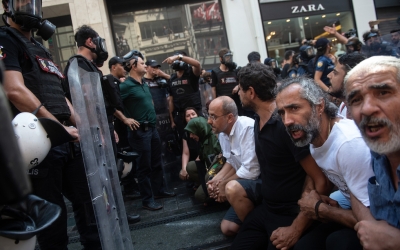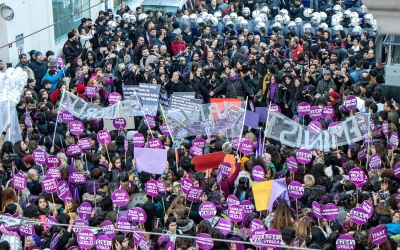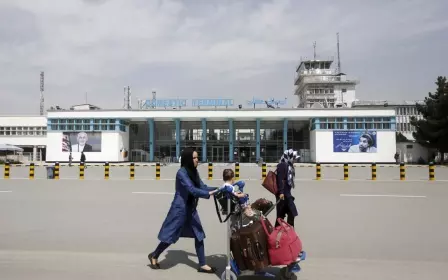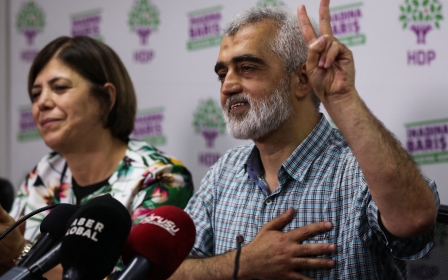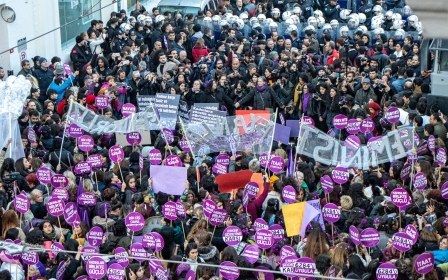Turkey: Relatives of disappeared in court for second hearing after arrests at vigil
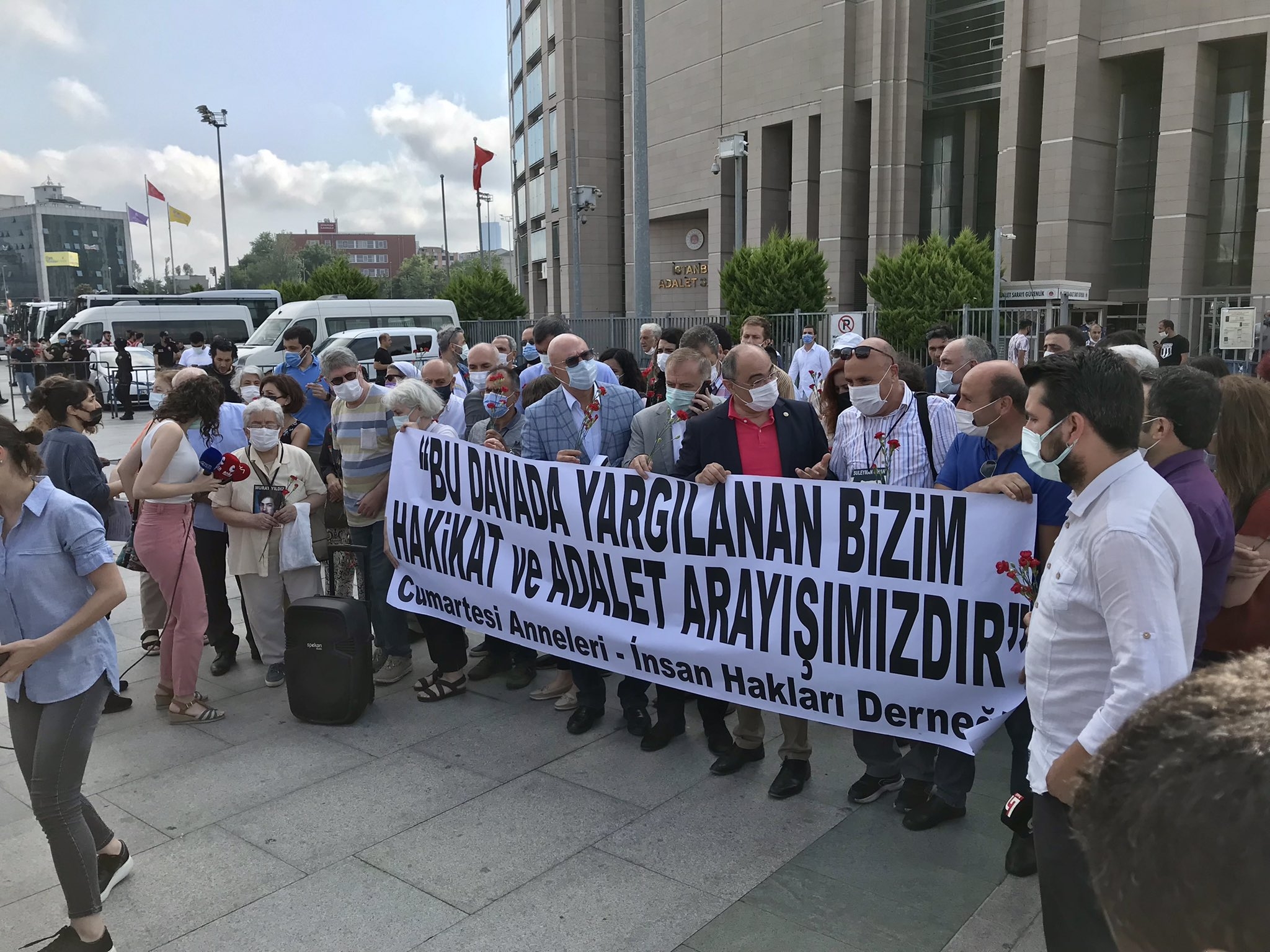
A high profile group of activists in Turkey, who have spent decades seeking the truth about relatives killed or disappeared by state agencies and paramilitary groups, appeared in court in Istanbul on Monday for the second hearing of a years-long trial in which they are accused of holding an "illegal gathering".
The Saturday Mothers, as the group is known, have held vigils in Istanbul's Galatasaray Square with red carnations each week since 27 May 1995, demanding to know the whereabouts of relatives kidnapped and killed at the height of Turkey's "dirty war" in the 1990s.
At their 700th rally on 25 August 2018, Turkish police broke up the meeting and arrested a number of the attendees after the vigil was declared illegal. Among those detained was one of the founding Saturday Mothers, 83-year-old Emine Ocak, whose son Hasan was arrested and disappeared in March 1995.
Forty-six people are currently facing charges of "participating in illegal meetings and marches without weapons and not dispersing spontaneously despite warning".
New MEE newsletter: Jerusalem Dispatch
Sign up to get the latest insights and analysis on Israel-Palestine, alongside Turkey Unpacked and other MEE newsletters
Translation: Carnations will not smell bitter in this country on the day when the perpetrators and those who absolved and hid them are tried, not those who have been seeking their relatives for 30 years!
Emine's daughter Maside Ocak told Middle East Eye that the Saturday Mothers' prosecution was an attempt by the Turkish state to distract from the main issue - its refusal to take responsibility for decades of killings and disappearances.
"The state refuses to accept its responsibility in disappearances in detention, or enforced disappearances, which constitute a crime against humanity, and by silencing the Saturday Mothers and Saturday People, the state is trying to cover up its crimes," she said.
"This is why it targets us with practices that disregard our freedom of expression and assembly."
She said that the Saturday Mothers and other activists now had to operate in "an atmosphere where the government seeks to close off all means to seek your rights and where objection is treated as a crime."
'We are the ones whose children and relatives were disappeared by the security guards. We have been searching for their lost ones for years'
- Ayse Tepe, sister of disappeared journalist Ferhat Tepe
Crowds gathered outside Istanbul's Caglayan courthouse on Monday morning in a show of support for the Saturday Mothers. A number of politicians from the main opposition Republican People's Party (CHP) and pro-Kurdish Peoples' Democracy Party (HDP) were present, along with representatives of the Turkish Human Rights Association (IHD) and the Diyarbakir Bar Association.
A number of supporters of the group on Twitter posted the hashtag "What's wrong with the carnation", in reference to the flowers that have become emblematic of the group, inspired by similar symbolism used by campaigners for the disappeared in Latin America.
Reading out a statement, Ayse Tepe - whose brother, journalist Ferhat Tepe, was abducted and killed in 1993 - said they would not willingly give up on their vigils, which she said was an expression of their "constitutional rights".
“We are the ones whose children and relatives were disappeared by the security guards. We have been searching for their lost ones for years. We have been shouting 'at least give us the bones of our children' in Galatasaray Square for years," she said.
Lawyers for the Saturday Mothers called for their clients to be acquitted at the hearing, which started more than two hours late.
Following objections from lawyers and CHP MP Mahmut Tanal, who was observing the hearing, to repeated interruptions by the presiding judge, the trial hall was ordered evacuated for a recess.
After the break, Tanal was not allowed back into the courtroom, leading lawyers to demand the judge be replaced for having lost his objectivity - a request that was rejected.
Eventually, the case was adjourned, with another hearing scheduled for 24 November.
'Provocative and shameless'
In the 1980s and 1990s, particularly after the beginning of the war with the Kurdistan Workers' Party (PKK), far-right organisations - often with links to the state and organised crime - would regularly abduct and murder left-wing and pro-Kurdish activists.
The body of Ocak's brother, a left-wing activist and member of the Marxist-Leninist Communist Party, was eventually found at a cemetery for unidentified bodies two months after he disappeared.
No-one has ever been tried or accepted responsibility for his death.
'We continue our struggle with a hope that is never extinguished that one day, justice will be done'
- Maside Ocak, sister of murdered activist Hasan Ocak
"Although witness accounts and official documents point to the state as the perpetrator, although the European Court of Human Rights ruled that my brother’s right to life had been violated, the perpetrators and those responsible for his murder were not tried and sentenced," said Maside Ocak.
"We continue our struggle with a hope that is never extinguished that one day, justice will be done."
Although authoritarianism is nothing new in Turkey, the country has been subjected to an unprecedented crackdown since a failed 2016 coup attempt.
Turkish President Recep Tayyip Erdogan blamed the coup attempt on former ally Fethullah Gulen, yet in the years since then opposition politicians and activists from across the political spectrum have faced jail, fines and mob violence.
Erdogan had once publicly supported the Saturday Mothers' campaign, even meeting with them to listen to their concerns.
However, following the break up of the 700th meeting - and the subsequent banning of the vigil - Omer Celik, a spokesperson for the ruling Justice and Development Party (AKP), said the Saturday Mothers had been infiltrated and there were now "terrorist groups openly taking advantage of this space".
"In 2011, before an election, we met with Erdogan. Erdogan’s discourse during that period included the EU, human rights and democracy," said Ocak.
"However, after 2015, he put aside that discourse and returned to state policies of security based on violence. Such policies always reject human rights and antagonise those who demand human rights."
The vigil was previously stopped between 1999 and 2009 following a severe crackdown by the government at the time. The vigils resumed in January 2009, only to be banned again in 2018.
At the time, Human Rights Watch denounced the ban as a "provocative and shameless attack on the right to non-violent assembly and free speech".
Emma Sinclair Webb, senior Turkey researcher at Human Rights Watch, said there was "plenty of evidence that the perpetrators of the disappearances in the 1990s were members of the security forces and paramilitaries connected with the state."
Middle East Eye delivers independent and unrivalled coverage and analysis of the Middle East, North Africa and beyond. To learn more about republishing this content and the associated fees, please fill out this form. More about MEE can be found here.


